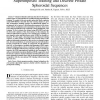Free Online Productivity Tools
i2Speak
i2Symbol
i2OCR
iTex2Img
iWeb2Print
iWeb2Shot
i2Type
iPdf2Split
iPdf2Merge
i2Bopomofo
i2Arabic
i2Style
i2Image
i2PDF
iLatex2Rtf
Sci2ools
TSP
2008
2008
On Doubly Selective Channel Estimation Using Superimposed Training and Discrete Prolate Spheroidal Sequences
Abstract--Channel estimation and data detection for frequencyselective time-varying channels are considered using superimposed training. We employ a discrete prolate spheroidal basis expansion model (DPS-BEM) to describe the time-varying channel. A periodic (nonrandom) training sequence is arithmetically added (superimposed) at low power to the information sequence at the transmitter before modulation and transmission; therefore, there is no loss in data transmission rate compared to time-multiplexed (TM) training. We first estimate the channel using DPS-BEM and only the first-order statistics of the observations. In this estimator the unknown information sequence acts as interference resulting in a poor signal-to-noise-and-interference ratio (SNIR) for channel estimation. We then apply a data-dependent superimposed training sequence, to either totally or partially cancel out the effects of the unknown information sequence at the receiver on channel estimation. In total cancellation, a...
| Added | 28 Jan 2011 |
| Updated | 28 Jan 2011 |
| Type | Journal |
| Year | 2008 |
| Where | TSP |
| Authors | Shuangchi He, Jitendra K. Tugnait |
Comments (0)

